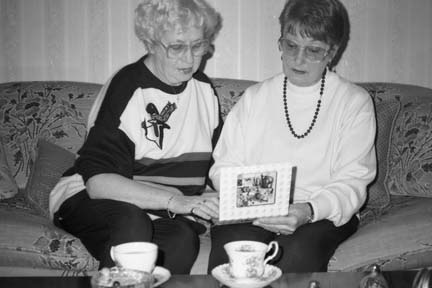For British War Brides and friends Irene Marsh and Joan Spencer, the Second World War was more than a black and white newsreel. This was a colourful and exciting time that would change their lives forever. The two women who met in Winnipeg were best friends for over 60 years when Joan passed away in 2022. In February 1998, I was fortunate to write the stories of these two contemporaries of Dickies From Gunton: Canadian Brothers in Two World Wars.
First published in February 1998 by Liz Katynski

Best friends Joan Spencer and Irene Marsh remember their journeys as British War Brides.
Part Two: Irene Marsh
In the fall of 1944, Irene Marsh had snuck out for the evening, with a girlfriend. She was a teen with a sense of adventure and a love of ballroom dancing. Usually, she would frequent Burtons Dance Hall, located under the famous Burtons British men’s shop in her hometown of Uxbridge- a Royal Air Force training centre which was not a part of London at the time. Things were hopping on Sunday and Thursday nights. Some of Glenn Miller’s band showed up one night and the place went wild. Above the dance music, you could hear air raid shells falling and the distant drones of the planes. The nights were pitch black because of imposed blackouts. Her family had no phone. So usually, Irene would sneak out before an air raid was called, before her worried parents would have reason to make her stay in.
But on this night, the two girls were hanging out at the Hammersmith Palais de Danse in London. It was a huge dancehall with three bandstands and alternating musical performers. There was a bar in the evening but tea only in the afternoons. US, Canadian, Polish, Swedish and British soldiers were about, yet to 16-year-old Irene, the British were not as glamourous as the rest. A red-haired Canadian soldier came up to Irene that night. “He was five years older than me. His name was Red. He was not the best dancer. He was a bomb aimer,” Irene remembers. “It was just meant to be.” Within the year, they were married.
That first night was full of excitement, taking trains to look for a lost friend, being questioned by police because she was out past the town curfew. But before Irene went home, she gave Red her address.
Soon after, she was walking in a blackout, feeling her way along in front of her. But somehow she missed a sign and gave herself a black eye. Irene took some time off from work at the Lyons Store. When she finally went in, her boss handed her a letter. It was from Red, who had lost her home address, but remembered she worked at the store. Though he addressed his note to the Leons Store, it had arrived despite the error.
Irene and Red wrote back and forth during November and December. Her parents took no notice because she wrote to many servicemen during the war, in order to send them magazines. In January, the couple went on their first date, to a movie. Red was polite and shy. Their second meeting lasted only a few hours. On Red’s third visit, he stayed overnight at her parent’s place, and asked her to marry him. On the fourth visit, in April, he gave her a ring. They kept writing. The war ended in May and they were married June 5, 1945, their fifth date together. Her dad made a cake, a special treat because sweets were rationed at the time. They had to hold the ceremony at a second church, because the first Vicar they asked would not marry the couple, for Irene was only 17 and much too young in his view, even though her parents had signed their permission.
Irene arrived in Winnipeg in April 1946. On a Sunday morning, her husband and his family drove her out to St. Vital. With its wooden sidewalks and lack of sewers, it made Irene think of the Wild West. “It was all a big adventure,” she recalls. When she first saw her husband, she says, “I thought to myself who is that man in the green tweed coat and hat? But his family treated me like I was their own daughter.”
Winnipeg had food and lots of it. Irene fondly remembers the availability of items like oranges, bananas and sweets, things that were rationed in England during the war. “We were deprived of them. We were rationed, though I don’t remember any real hardships. It was overwhelming.”
Irene and Red stayed with his family for a short while, on Saddler Avenue. Red worked in the mines in Sudbury for a short time. In Sudbury, their first daughter was born. But they drove back to Winnipeg in 1947 and continued to reside in St. Vital.
Irene too has been home to England to visit. “It’s a strange feeling. When I was here, there was home and when I went there, here was home.”

Thanks!
Nice finish to the story Liz! enjoyed it.